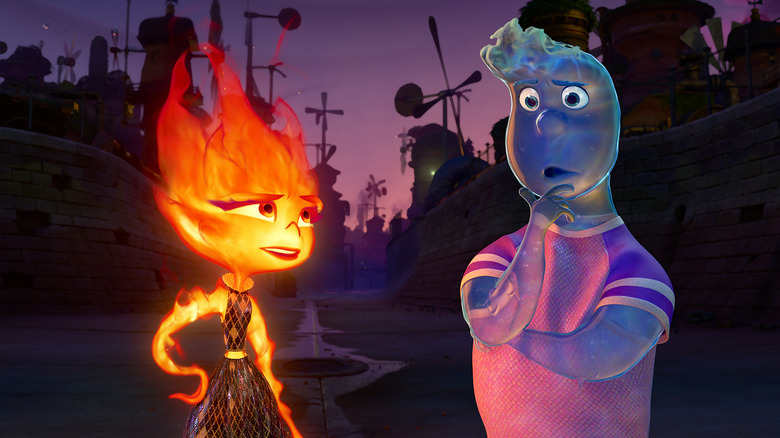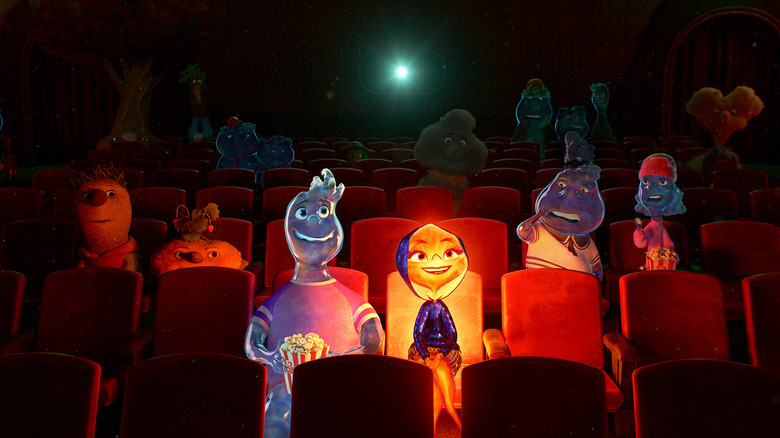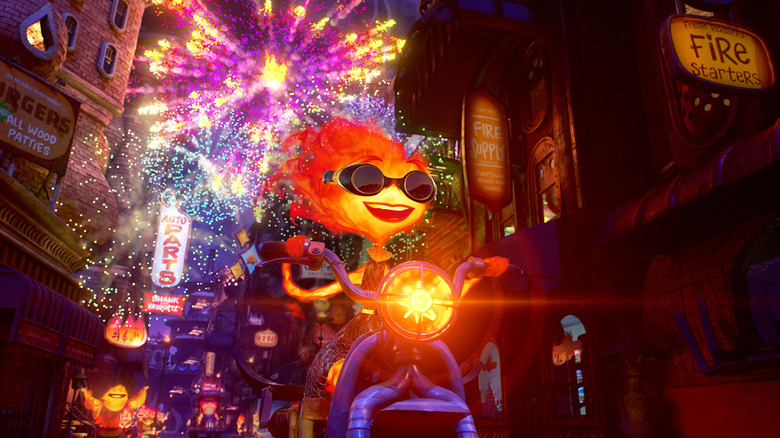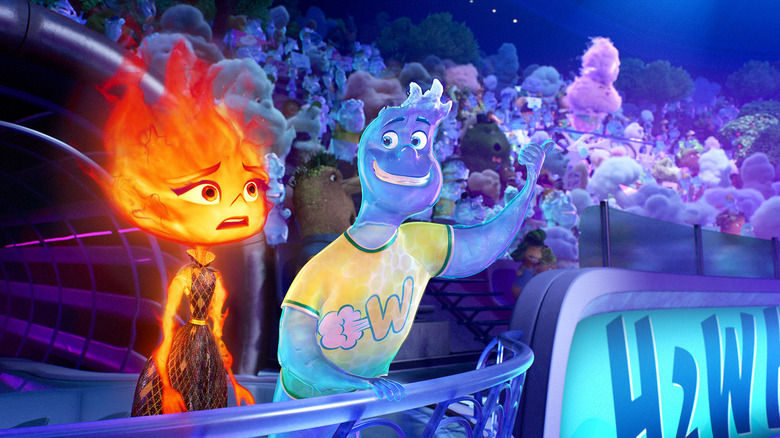Elemental Filmmakers On Creating A Hopeful Story In An Unhopeful Era [Exclusive Interview]
Pixar has been the source of countless magical movie moments for the last three decades, and their newest original film, "Elemental," is no different. /Film contributor Josh Spiegel highlighted the film's incredible animation in his review, noting that "the depth and textures of Element City itself is often remarkable." Admittedly, I had a far more positive reaction to the film than Spiegel (art is subjective!), but it was because of how deeply the emotional storytelling resonated with me on a personal level.
Director Peter Sohn has already spoken at great length about how "Elemental" is an immigrant story inspired by his own upbringing wrapped in a romantic comedy, but it blew me away how the creative team successfully managed to integrate a variety of identities into this world. Element City is home to water, earth, and air residents, while the newly immigrated fire folk are pushed aside into their own area just outside of the city limits. As no specific race or identity is meant to wholly represent any individual element, it allows the audience to see themselves and relate to any of the characters at any given moment.
I understand the anxiety around assimilation as a queer person in a heterosexist world like fire person Ember, but I also cry a lot like water person Wade. I was honored to recently visit the Pixar campus in person where I sat down with Sohn and producer Denise Ream to talk a bit about the emotional throughline of "Elemental" and how even us fleshy meat sacks of human existence might see our own stories reflected in this touching tale of fire and water.
Note: This interview has been edited for length and clarity.
'A sincere search for something that feels real'
My first question for you is how dare you make me cry in public and where can I send the invoice for my therapy appointment this week?
Ream: I'm with you there. [laughs]
There's kind of this, I guess, running joke that Pixar movies are guaranteed to make you cry. Is that a conscious thought when writing a story of like, "Well, we got to have this tear-jerker moment," or is it just something that has to come naturally with the story?
Sohn: It comes naturally with the story. There was never a checklist for it, but all you ever do is you're trying to find a connection point, really, and at the same time, goof off and have funny ideas going on. You're in rooms like this, literally, where you're sort of [meeting] and talking about ideas of the story, but then every so often there'll be some little nugget that we all connect to like, "Wait, so what happened?" It's like, "Yeah, my mom did X or Y," and then all of a sudden this authentic emotion comes up that you all resonate [with], and we're just chasing that. You're just trying to chase something that feels real from this point of view. But it's not like, "Ta-da! The formula for tears: 60 percent wetness!" It's always just a sincere search for something that feels real to each other.
Ream: Yeah. I think because these stories tend to come from people's personal experiences, I think that lends to, perhaps, why they can be more emotional than the standard film.
Definitely. I mean, that's what separates us from AI. AI can't have trauma, but we can!
Sohn: [laughs] Can you trademark that, please? [laughs] AI cannot have trauma!
'Oh, if it's resonating, it could have those possible connections'
This is such a specific story with it being an immigrant story, but at the same time, it feels universal and very relatable even if that is not your experience. How do you take something that is so specific and make it feel welcoming to everybody's experience?
Sohn: So much of it has to do with this belief in this kind of resonance. I used to make fun of the periodic table of elements. I used to make fun of it by adding like, "It looks like apartment complexes to me. Copper lives next to helium, but they're gassy, so be careful." I used to do these jokes, but it was never a story. It was just something I did in school. But then later, years, years later, I had this event with my parents where I got to thank them for the sacrifices that they made. It was a very moving thing for me and I came back to Pixar and I told some folks this story and they're like, "Oh, that's your film and you got to do that. That's the next idea for you." And it's like, "Okay."
It was such a moving thing that it became this guiding light, but I didn't know where to put that into a vehicle. But then it started merging with that old idea of, "Oh, right, part of their experience was they came to a new place without any money, without knowing the language." That feels like this world of apartments with these different disparate elements and I boiled it down to this earth, water, fire, air thing. That started to grow into something that the idea resonated with the images and the world idea, but that wasn't it. This little personal nugget that I had, as we brought more people on, they would all connect to it in different ways. Then Denise got us getting to talk to a whole bunch of artists at Pixar from all over the world, all first-gen, second-gen, and they all started resonating with it, but then also bringing their own personal lives to it. That is almost like a little something that tells you that like, "Oh, if it's resonating, it could have those possible connections."
Ream: Yeah. More far-reaching, yeah.
'It made me feel more passionate about telling this story'
Absolutely.
Ream: Yeah. I mean, it was pretty phenomenal to see how many people really did have similar journeys to Pete, and I don't know, it's what really made me feel passionate about the project.
I know this has been a long time coming for everybody involved and this is such a story about the communities that we surround ourselves with. But communities have been fracturing as of late. I'm curious: How did watching the world change around us impact telling this story?
Ream: Wow. Well, for me, it made me feel more passionate about telling this story and realizing, I mean, we need to keep our hearts open and our world is so much more interesting when we do that. It was a pretty crazy time.
Sohn: Yeah. I mean, it was a long project and we went through lots of history in the last seven years.
Ream: We had three U.S. presidents during the making of our movie.
Sohn: Yeah. And both my parents passed away. We all had losses in this, so it was this long journey of trying to understand what was going on in our world. And then Covid hits, and I mean, all of that definitely just gets into — it's impossible for it not to. And so all you can do is try to be as aware as you can about what the perception could be from the intent of the film. But more than anything, the intent, because it came from such a personal place, every space in my life that has had some sort of division or something that felt like it was too far to reach — empathy and compassion, as simple as those ideas are, are such powerful bridge makers. This movie starts off with this little love story with water and fire, but then it grows to this family story with this conflict and then the city. And each one of those layers, the answer is just about that empathy, that bridge, it makes that connection. We've always wanted to do a hopeful film with this...
Ream: There were some very sad, unhopeful times there, and we're happy to be on the other side of it, where I think you were able to do that, to instill that hope in the story.
"Elemental" debuts in theaters on June 16, 2023.



